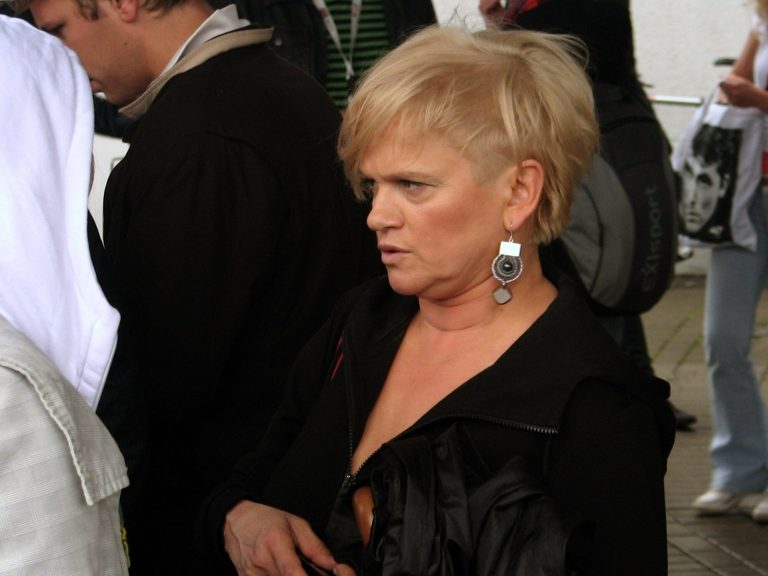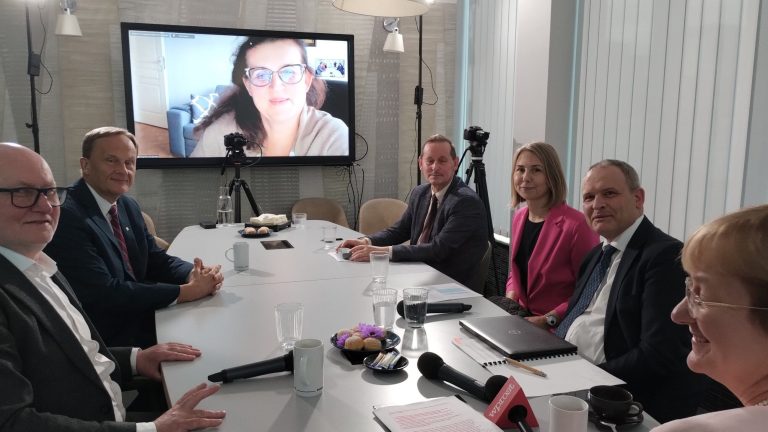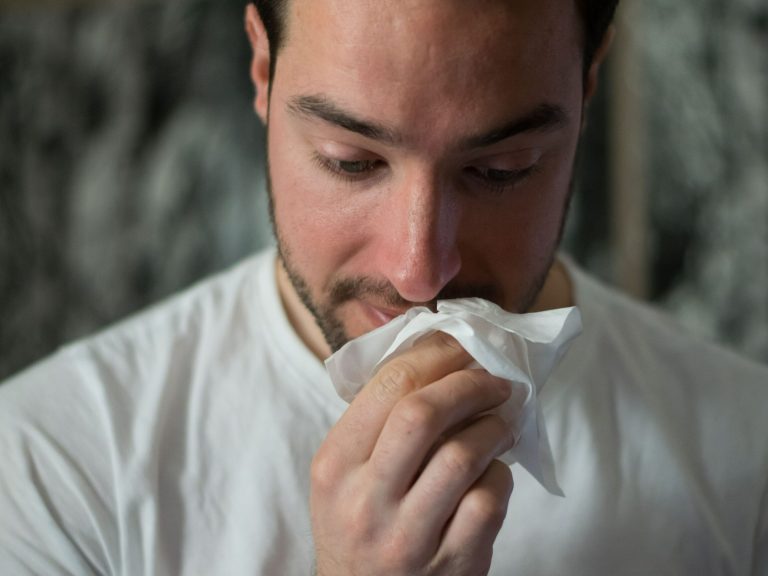She could only sleep sitting up, with the window open. The real diagnosis was made when she was in critical condition

She was 38 years old when she could barely climb four flights of stairs. Then it got worse. Shortness of breath became more severe despite increasing doses of anti-asthma medications. After a few steps, she became weaker and finally had only the strength to blink her eyes to say “yes” or “no”. Her belly was also growing alarmingly. Małgorzata Piekarska, who has been suffering from the insidious disease of pulmonary arterial hypertension for 11 years, talks about the path to diagnosis, treatment and hopes for a new drug.
You suffer from pulmonary arterial hypertension, a rare disease. What was your path to diagnosis? What disturbing symptoms did you notice?
Małgorzata Piekarska: I noticed that I was having more and more effort problems – when I came back from the store with purchases, I had to stop more and more often on different benches, put down my purchases and wait to catch my breath.
Then you had…
How many years? 38. Yes, I had been suffering from chronic leukemia for several years, but the disease was under control – I took medications and felt good. I was a slim, fit person, I rode a bike and exercised a lot.
I was very worried about my deteriorating health.
I live on the ground floor, I have four steps to climb, sometimes I had to climb one at a time. I also had to take a moment to catch my breath before opening the door. I was also concerned that my abdominal circumference was increasing.
When I went to the doctor, the first diagnosis was that I was eating too much, hence the abdominal swelling, and the respiratory problems were due to the exacerbation of asthma, which I had been struggling with for about 10 years. I couldn't understand it because my asthma was “muted” and I even managed to stop taking steroids for a while. The doctor advised me to take more steroids and bronchodilators. However, I saw that it did not help, the problems became even worse. My belly circumference was getting bigger and bigger. I usually wore tight dresses; now I couldn't fasten them. I heard more and more often that I needed to lose weight, but I knew that my belly was not getting bigger due to excessive eating, because sometimes I ate only one banana all day.
I also did inhalations, but they didn't help much either. Doctors said I was anemic due to heavy periods, and I was taking medication for leukemia, so I had the right to feel bad. In hindsight, I am angry that no one noticed that I always took anti-leukemia drugs at 6 p.m., and I had shortness of breath attacks at 20. Doctors talked about asthma flare-ups, but how is it possible that these attacks always happen two hours after taking leukemia medication? After all, there is no such thing as “asthma per hour”.
Did no one think that there could be another reason for the deterioration of health in a fit, physically active woman in her thirties? Did you go from doctor to doctor?
Yes, because I felt worse and worse. I also knew that my belly wasn't getting bigger because I ate a lot, since I ate so little. My health condition was getting worse, I was having more and more shortness of breath. I slept sitting up because I couldn't breathe otherwise. The window had to be wide open even in winter, and I slept in a hat and sweater. It didn't help; on the contrary – it was getting worse, after taking a few steps I felt dizzy and had no strength to speak. Finally, my husband took me to the hospital. An x-ray of the lungs did not show any changes, but the doctor, after telling me everything, examined my abdomen and said that I had a lot of water there. They started dehydrating me. Even though I didn't drink anything, water still accumulated. I felt worse and worse, I had no strength to speak, I could only blink my eyes to say “yes” or “no”. I had a heart ultrasound performed and it turned out that the right ventricle was enlarged. My chemotherapy was immediately discontinued and the water in my abdomen and lungs continued to be drained. It didn't help much, it kept accumulating.
I didn't eat or drink anything, and my belly was huge. Then I suspected pulmonary arterial hypertension. I was already in a critical condition when I was transferred to a hospital where pulmonary arterial hypertension was treated.
There I was given more dehydration medications. During 10 days of very intensive deodorization, I lost about 12 kg of water. When the abdominal circumference decreased, cardiac catheterization was performed, which confirmed that I had pulmonary arterial hypertension. I got treatment. The doctors also contacted my hematologist – it turned out that the drugs I was taking for leukemia could have caused the development of pulmonary arterial hypertension: this happened in rare cases.
How do you function today: almost 11 years after diagnosis?
I am on the strongest three-drug therapy today, it is the European standard. I get, among others: medications administered through a pump (I have it implanted because subcutaneous administration was too painful for me).
When it comes to everyday life, I try to function as best as I can. I have certain limitations, the worst thing for me is that I am dependent on other people. I don't bring the groceries myself, so I always have to have some supplies at home in case, for example, my husband gets sick and there's no one to go to the store.
My husband helps me a lot, he says that this is what marriage and partnership should be about, but despite everything it is not easy. I have trouble even going outside the house because I have to go to the bathroom often because I have to take dehydration medications.
Misunderstanding the disease is also a big problem. Every day I don't show that I'm sick. I like to wear make-up so I don't look sick. When I go to the store and feel bad, sometimes I would like to take advantage of the opportunity to shop without having to queue. People don't understand that I'm sick. Now I have a pump sewn into my belly, so I pretend I'm pregnant, but it's not supposed to be like that. We moved to the countryside because it was hard for me to breathe in Wrocław. But when we lived in Wrocław and my mother came and washed the windows, I heard that “the young one sits at home, doing nothing, and the retired mother comes and washes her windows.”
Is the disease unpredictable?
And very false. In our association, there are patients who were in stable condition, returned from vacation, made plans, and after a week they were gone. We feel good, but somewhere in the back of our heads a voice says: “It's nice that I feel good, but Justynka also felt good, and now she's gone.”
There are also great dilemmas. A friend of mine recently wrote to me that she had registered her 14-year-old son for a transplant. I say it's very good, but she's afraid of what will happen if the transplant fails and her son doesn't wake up? He knows that without the transplant his son will die because his condition is getting worse, but he is afraid that the transplant will hasten his death? Another dilemma: the couple has two children, one of them has pulmonary hypertension. When the other has a cold or flu, my husband takes him to his grandmother or to his friends so that the child with pulmonary hypertension does not get infected, because the infection is dangerous for him.
That is why it is so important to have an association that supports each other. What are you trying to change systemically in the treatment of pulmonary hypertension in Poland?
Support is important: no one who does not suffer from the disease can imagine the pain of having to perform a new injection, the fear of the future, the fear of making a decision, e.g. about a transplant.
The problem is that everyone in our association is sick. We fight, but we also struggle with our own illness and often lack the strength to take further action. We dream of raising funds for psychological help – many people need such support. We also lack dietary help and support, especially for patients who have chronic diarrhea. Another thing is oxygen concentrators, necessary for some patients. Portable oxygen concentrators are not reimbursed by the state, so we try to buy them so that the patient can at least go for a walk when he feels well, or can go to pick up medicines. One costs approximately PLN 15,000. We will strive to make oxygen concentrators free of charge for patients, as well as portable ones – for all patients for whom it is necessary.
We are also waiting for a new biological drug, which will soon be registered for our disease. Today I have the best possible treatment, but it only slows down the course of the disease. The new biological drug will work much more effectively. We know that the clinical parameters of patients who started treatment with this new drug in clinical trials are improving. Patients even said that they felt as if they did not have the disease. We are counting on this drug very much.






